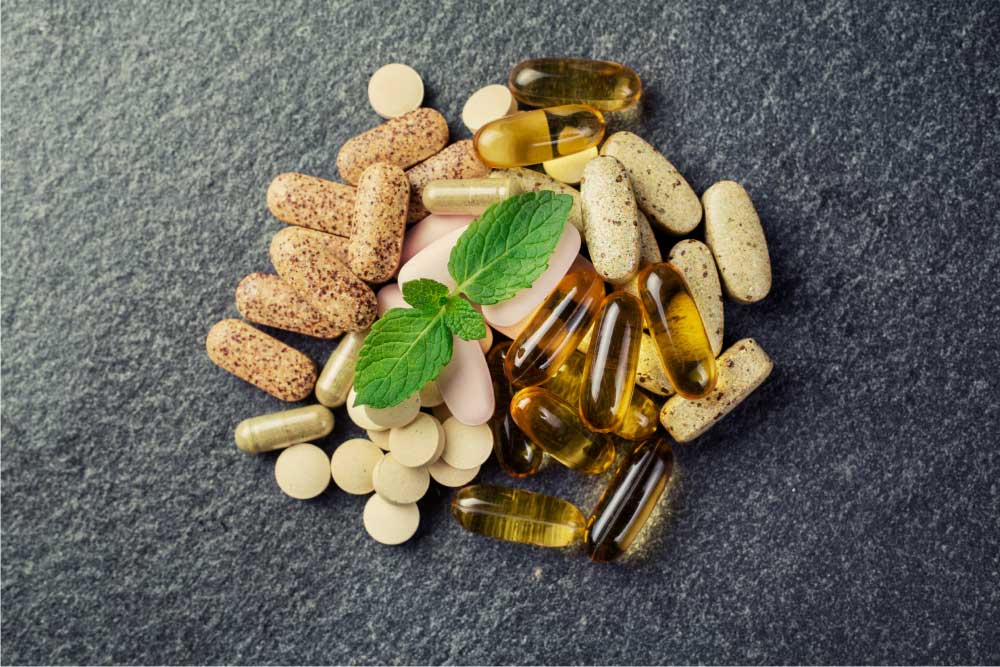


Date: 15 Sep 2025
Everyone dreams of having glowing, healthy skin. While good skincare routines are important, science shows that what you eat—and sometimes the supplements you take—can have a significant impact on skin health.
The right vitamins, minerals, and proteins can boost elasticity, reduce acne, and even slow early signs of aging. However, with numerous products on the market, it’s crucial to distinguish between evidence-based solutions and hype.
Skin supplements are nutritional products, such as capsules, powders, or gummies, that aim to improve skin health from the inside out.
Unlike topical lotions or serums, which act on the skin's surface, these supplements provide vitamins, minerals, proteins, and antioxidants directly into the body, where they can impact cellular repair, hydration, and collagen synthesis.
They frequently contain nutrients such as collagen peptides, biotin, zinc, vitamin C, probiotics, and omega-3 fatty acids, which help to improve skin suppleness, reduce acne, fight inflammation, and slow the appearance of aging.
Skin supplements, when paired with a healthy diet, hydration, UV protection, and proper skincare routines, can help you retain a clearer, firmer, and more radiant complexion in the long run.
Our skin often reflects what’s happening inside the body. Diets rich in fruits, vegetables, whole grains, and proteins usually result in clearer, brighter skin. Conversely, diets high in sugar and processed foods can worsen acne, dullness, and dryness.
Certain nutrients are particularly vital:

Acne is not just a surface problem—it’s influenced by hormones, diet, and inflammation.
Collagen is the main structural protein in your skin, giving it firmness and elasticity. As you age, collagen levels naturally decline, leading to fine lines, sagging, and dryness. Hydrolyzed collagen peptides, found in supplements, are broken down into smaller amino acids that the body can easily absorb.
These peptides stimulate collagen production and improve hydration. A 2019 clinical trial confirmed that women who took collagen peptides for 8 weeks experienced significantly better skin elasticity and moisture.
Zinc is an essential element that helps with cell repair, hormone balance, and immune system support—all of which have a direct impact on skin health. Zinc is extremely good for people who suffer from acne.
It regulates oil production in the skin's sebaceous glands, lowers inflammation, and promotes faster wound healing, all of which can speed up the recovery process from acne breakouts and scarring. In fact, a 2014 study discovered that zinc supplements reduced the severity of inflammatory acne, making them an effective alternative for treating breakouts.
Health benefits, including improved heart health and reduced joint discomfort, have been demonstrated for omega-3 fatty acids. Can they, however, make your skin seem better?
The function of the skin depends on omega-3 fatty acids, and insufficient intake can harm your skin and potentially result in skin disorders. Omega-3 supplements may help people with skin disorders like psoriasis, acne, atopic dermatitis, and skin ulcers, according to research.
Supplements containing omega-3 may also help prevent skin cancer. Apart from helping to treat acne, there isn't much proof that omega-3 supplements actually improve the skin's appearance.
Probiotics are organisms that promote the growth of important bacteria in the gastrointestinal tract and on the skin.
The stomach and skin are intimately connected via the gut-skin axis, which means that poor digestion and imbalanced gut bacteria can cause inflammation to manifest as acne, eczema, or dull skin.
Probiotics promote healthy gut flora, which reduces systemic inflammation and improves nutrient absorption for improved skin regeneration. They may also lower oxidative stress and promote immunological balance, both of which improve skin clarity.
According to a 2018 analysis in the journal Frontiers in Microbiology, probiotics can help control acne and other skin disorders by restoring intestinal equilibrium.
Skin supplements are designed to support the dynamic processes involved in maintaining and restoring skin health and structure. Specific skin supplements have been proven to be beneficial in:
Supplements work best when combined with healthy habits:
Healthy and glowing skin starts with the right care from the inside out. Whether you’re looking to boost collagen, fight acne, or strengthen hair and nails, Pharmily Limited Kenya has trusted supplements for your needs. Explore safe, science-backed options today at pharmily.co.ke and enjoy convenient delivery to your doorstep.
1. Do supplements really work for glowing skin?
Yes, when taken consistently and combined with a healthy diet, supplements like collagen, vitamin C, and biotin can improve skin elasticity, hydration, and overall glow.
2. Which vitamin is best for acne-prone skin?
Zinc, vitamin A, and probiotics are most effective. They regulate oil production, reduce inflammation, and restore balance to the skin.
3. How long do skin supplements take to show results?
It usually takes 6–12 weeks of consistent use to see noticeable improvements in skin texture, glow, or acne reduction.
4. Are supplements better than skincare products?
They work hand in hand. Supplements nourish your skin from within, while skincare products protect and treat from the outside. For best results, combine both.